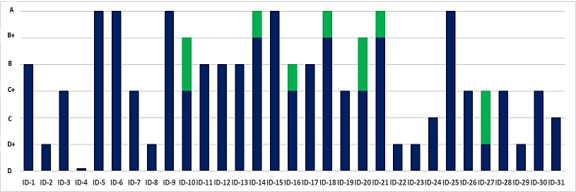PFM in Colombia has long supported fiscal discipline, macroeconomic stability and sustainable development.
Since 2009, Colombia has consistently used the internationally recognized Public Expenditure and Financial Accountability (PEFA) framework to track progress[1]. The recent 2024 PEFA assessment evaluated national-level PFM performance and built on the previous 2016 assessment. It also included baseline evaluations for gender and climate-responsive PFM using the new PEFA Gender and PEFA Climate frameworks.
A Solid Foundation and Notable Progress
The 2024 PEFA assessment shows that Colombia’s PFM system is well aligned with international standards. Over 80 per cent of all indicators meet or exceed the threshold for good practice, and about one-third reflect advanced practices. The eight-year follow-up comparison reveals some measurable reform-driven improvements in key performance indicators, denoting a more mature and adaptive PFM system (see Figure 1). Some performance loss was also experienced, but in relatively few cases.
Figure 1: PEFA Colombia 2024 – indicator scores showing improvements from 2016

Source: PEFA Colombia 2024-Final Report, https://www.pefa.org/country/colombia.
Colombia’s macro-fiscal framework is a key strength. The medium-term fiscal strategy is based on sound macroeconomic forecasts, supported by an independent fiscal council and a fiscal rule with clear targets. These institutional arrangements have enhanced policy-based budgeting and fiscal sustainability. Fiscal risk management, including climate-related risks, has improved alongside treasury operations and expenditure controls, reinforcing fiscal discipline.
Transparency is another hallmark of Colombia’s PFM system. Timely and comprehensive budget documentation, plentiful public access to fiscal data, and reporting of extra-budgetary operations align with advanced standards. Ongoing reforms in budget classification and results-based budgeting are expected to further advance transparency and public engagement in the near future.
Three other areas continue to perform strongly: public investment management, which is aligned with national priorities and supported by rigorous evaluations and monitoring; asset management, which benefits from clear legal frameworks and technical procedures; and debt management, which, despite lacking an updated medium-term strategy, is supported by solid institutional controls and reliable data systems.
The PEFA Climate assessment earned top scores for aligning the budget with climate change strategies and managing climate-related liabilities. The climate change assessment indicator also performed well, positioning Colombia as a regional benchmark. On gender, the government was positively rated for tracking gender-related expenditures and reporting annual progress toward gender equality.
Areas Needing Further Attention
Despite these strengths, the PEFA 2024 assessment identifies some areas for further improvement, particularly in budget execution, accounting, reporting, and external oversight. Closing these gaps is essential for PFM to deliver services effectively and accountably, particularly as Colombia incorporates gender and climate considerations into PFM functions.
Revenue administration and treasury management generally score well for fund collection and cash management. However, challenges persist in managing tax and payment arrears, which affect execution predictability. Weaknesses in payroll controls and the limited use of competitive procurement methods also hinder efficient and transparent budget implementation.
Accounting, reporting and audit functions need further strengthening. Internal audit units follow risk-based plans but focus mainly on financial and compliance audits and lack a quality assurance system. Financial reports increasingly align with international standards but remain incomplete, with ongoing issues in data integrity and quality control. These concerns, which are reflected in qualified audit opinions from the Supreme Audit Institution, together with limited legislative follow-up on audit findings, weaken accountability.
Budget reliability is another area for improvement. While aggregate execution is credible, the composition of spending often diverges from the originally approved budget. Enhancing expenditure forecasting and monitoring tools would help reduce deviations and improve policy effectiveness. This is especially important as Colombia advances gender and climate-responsive budgeting, where predictable funding is crucial to achieving policy goals.
Reform as an Ongoing Process
Since the early 2020s, Colombia has pursued an ambitious PFM reform agenda, supported by development partners. The strategy, extending to 2029, is anchored in legislation and coordinated by a high-level committee of key public institutions. It aims to integrate PFM systems to improve efficiency, effectiveness, and transparency in service delivery. Priorities include stronger governance, better financial information, greater spending efficiency and sustained capacity building.
To summarize, despite progress, challenges remain. Colombia’s PFM environment must adapt to evolving social demands, pension reform, climate-related fiscal pressures and economic uncertainty. Digitalizing financial systems and embedding gender and climate considerations into planning and budget execution processes require continued effort. Reforms must balance emerging priorities with fiscal discipline and service delivery goals.
Looking Ahead
Colombia is well-positioned to continue strengthening its PFM system. Ultimately, a transparent and accountable PFM system is vital for public trust, civil society engagement and effective governance. Monitoring progress and planning for a new PEFA assessment around 2029 will help sustain momentum.




